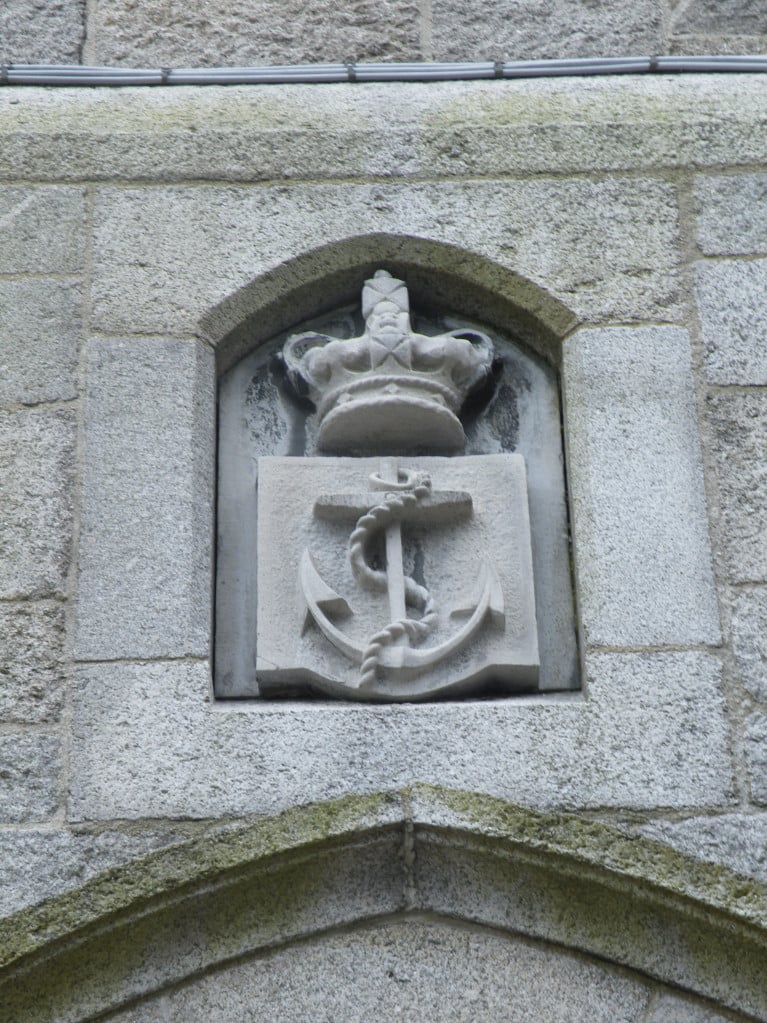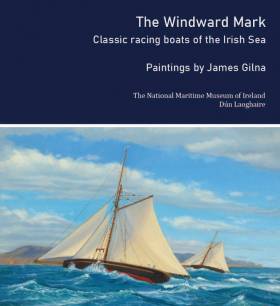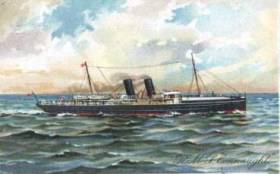Displaying items by tag: National Maritime Museum
Free Heritage Tours of National Maritime Museum of Ireland in Dun Laoghaire's Old Mariners' Church
Free self-guided tours of the National Maritime Museum of Ireland (NMMI) in Dun Laoghaire form part of the annual 'Summer of Heritage' programme run by the Heritage Office of Dún Laoghaire-Rathdown County Council, writes Jehan Ashmore
The Maritime Museum located aptly near the coast in the former Mariners Church which itself is one of a few custom built places of worship for seafarers remaining intact in the world today. Opposite of the museum in stark architectural contrast is the dlr Lexicon, flagship library of the council and a landmark almost opposite of the the harbour's East Pier on Dublin Bay.
Both venues are easily accesible from the nearby DART station and several bus services. There is also local car-parking at the Pavilion complex that neighbours the Lexicon.
Museum Tours of Maritime Heritage
This year's tours of the NMMI will be somewhat different due to the health and welfare of visitors and staff which is a primary concern for all and so the museum have made a few changes to accommodate the heritage-held programme.
Visitors will be able to experience a voyage through enthralling stories of discovery, heroism, war and disasters at sea. In addition to see nature and art inspired by the sea and also hear about innovative Irish inventions, scientists and local mariners which collectively form a treasure trove of matters maritime.
The tours are held every Monday and Wednesday until Wednesday, September 9th.
Each tour will be staggered apart, with one beginning at 11:00am and the other tour taking place at 11:30am.
Limited Tickets (click the NMMI website / Eventbrite here)
There will be a limit of six people per tour.
Noting the musuem will only have an allocation of 14 places per day and the NMMI advise if you know you are not going to be able to make it, please cancel your booking and let someone else take your place.
Covid-19
As of 10 August in a directive issued from the Department of Health, face coverings are mandatory in Museums and some other public spaces. Please ensure you have a face mask before entering the Museum to be compliant.
Patrons of the self-guided tours will be requested to strictly adhere to observing social distancing with people outside their household.
Brief background on Old Mariners Church
The museum’s greatest artefact is probably the former church itself as it is one of a few custom built places of worship for seafarers remaining intact in the world.
The Old Mariners' Church of the Church of Ireland was erected in 1836, to the design of Joseph Welland, which according to the publication ' New Life, for churches in Ireland' (2012) was for the benefit of many a sailor, who were based in the then harbour town named Kingstown where British Navy vessels used. All naval crew were obliged to attend Devine Service. Also according to Mary Hamilton, writing in th early 1900's, describes Welsh and Cornish fishing crew along with the local congregation, crowding the church, which, with its spacious galleries, could accommodate up to 1,000 worshippers.
The church closed in 1970 including the school building and residence which was sold off separately, however the former place of worship was leased from the Representative Church Body of the Church of Ireland to the Maritime Institute of Ireland (M.I.I.) which was founded in 1941 and also led to the formation of the NMMI.
Four years laters in 1974 the M.I.I. opened using the old church (having relocated from within the harbour) to the newly reconfigured and refurbished building that became their headquarters and museum albeit as the book describes for a 'peppercorn' rent. The building in more recent times was transferred to the museum.
The museum was open to its members and public alike over the decades until closing temporaily during the mid-2000's due to a deteriorating state of the old church building both outside and internally. Such conditions can be personally attested having observed with dismay water ingress near the pulpit and pigeons flying inside!
After securing government funding during the Celtic Tiger era this enabled an extensive refurbishment that ultimately led to the NMMI officially reopening on 5 June, 2012 by President Michael D. Higgins, patron of the museum from where that day the above photo was taken and published in the book by the Ulster Historic Churches Trust.
Sailing Art Exhibition Opens In Dun Laoghaire — And Meet The Artist On Culture Night
A new exhibition of classic racing boat paintings by Afloat.ie reader James Gilna opens today (Wednesday 18 September) at the National Maritime Museum in Dun Laoghaire.
And the artist himself will be in attendance to discuss the works included in The Windward Mark from 5.30pm this Friday 20 September as part of Culture Night activities nationwide.
Paintings in the exhibition, which runs until Sunday 20 October, feature classic sailboats such as the Dublin Bay 21s and Howth 17s racing at Kingstown Harbour and in various locations around the Irish Sea.
A maritime artist based in Dublin, James Gilna is an alumnus of Dun Laoghaire School of Art and Design and the National College of Art and Design. He also sails and races Erica, his classic gaff rigged boat which was designed in 1897.
Earlier this year, Gilna tipped us to the auction of a painting by renowned maritime artist Montague Dawson of a boat supposedly racing on Lough Derg.
The events depicted in the painting were subsequently questioned by a Lough Derg yachting historian, who raised a number of points where Dawson may have taken artistic licence with his work.
Lecture: "Leinster's Sister: The Sinking of the RMS Connaught"
#RMSconnaught - In 2018 is the centenary of the sinking of mail-boat RMS Leinster off the Kish Light by a German U-Boat in WWI, what is less well known is the sinking of sister RMS Connaught on 3 March 1917.
To mark the historic occasion the National Maritime Museum of Ireland, Dun Laoghaire is to host a lecture about the event by distinguised author and historian Phillip Lecane.
Galerum Gabrielis Heads for National Maritime Museum
#MusicINmusuem – An evening of baroque music by Galerum Gabrielis is to be held in the National Maritime Museum of Ireland, Haigh Terrace, Dun Laoghaire on Thursday 11 June (8:00 pm - 10:00 pm)
A wonderful evening of the finest Baroque music will be given an unusual presentation in the venue of the former Mariners Church by Evin Kelly (Bayan) and Norah O'Leary (Baroque Cello).
The range of music will be from G.P. Telemann; G.B. Vitali; J.S. Bach; G. Frescobaldi and A. Vivaldi
Tickets available before the concert or at the door. €10.00 per head
The museum also has a gift shop and café. For further details and information visit: www.mariner.ie
Lecture Centenary: The Building of the Lusitania
#LectureLusitania – The Building of the Lusitania is the lecture topic that Cormac Lowth will present in conjunction with the National Maritime Museum of Ireland in Dun Laoghaire next Thursday, 30th April.
Cormac's illustrated lecture will tell the story of the building of the Cunard Line's RMS Lusitania's fateful last journey 100 year ago when she was struck by a U-Boat torpedo during WW1 off the Old Head of Kinsale on 7 May 1915. It is generally considered as being the most significant reason for the United States to finally decide to declare war on Germany.
In addition Cormac will delve into the mysteries of her alleged cargo, the second explosion, salvage attempts and the Special Preservation Order.
Lecture Information: Admission is €10.00 (payable at door from 7.30pm) followed by the talk at 8.00pm. Bookings can also be made be email: [email protected] or Tel: (01) 2143 964
The Maritime Institute of Ireland museum on Haigh Terrace, Dun Laoghaire will also staging a special exhibition on the disaster during the month of May.
The museum also has a gift shop and café. For further details and informantion visit: www.mariner.ie
An Evening With Frank McNamara at National Maritime Museum
#McNamaraConcert - Frank McNamara, will play a once-off concert next month in the National Maritime Museum of Ireland, Dun Laoghaire.
The internationally known arranger, conductor, composer, and pianist would be familiar to many as the Musical Director of the Late Late show for over 20 years.
Tickets for the evening two-hour concert (8-10pm) on next Saturday, 30th May cost €20.
They are available through either [email protected] or Tel: 01 2143 964
For further information in general about the Maritime Institute of Ireland's museum on Haigh Terrace, Dun Laoghaire which has also a gift shop and café visit: www.mariner.ie
Centenary Lecture: The Building of Lusitania
#LectureLusitania – The Building of the Lusitania, that's the title of the next lecture to be held in National Maritime Museum of Ireland in Dun Laoghaire next Thursday. 30th April.
The centenary lecture beginning at 8:00pm is to be presented by Cormac Lowth, who will accompany the talk with illustrations.
Lowth's Lusitania lecture running for two-hours is been held in conjunction with an exhibition in the Museum's beautiful restored former Mariners Church building.
The exhibition tells the story of her last fateful journey, the mysteries of her alleged cargo, the second explosion, salvage attempts and the special preservation order.
Lecture Information: Admission is €10.00 (payable at door from 7.30pm).
Bookings can also be made be email: [email protected] or Tel: (01) 2143 964
For further information about the Maritime Institute of Ireland's museum (including a gift shop and cafe) on Haigh Terrace, Dun Laoghaire, visit: www.mariner.ie
Lecture: The Story of A Dublin Pilot
#LectureDublinPilot – The Story of a Dublin Port Pilot, that's the title of the next lecture to be held in National Maritime Museum of Ireland in Dun Laoghaire next Thursday.
The two-hour lecture starts at 8:00 pm and will be presented by Captain Jim Kennedy, a retired Pilot from Dublin Port. Kennedy will talk about the interesting, exciting and amusing account of life guiding the great ships into Dublin Port in all weathers.
Over the years on Afloat.ie we have mentioned the port's current pair of Safehaven Marine built Interceptor 42 class pilot cutters as they head out into Dublin Bay to transfer pilots to and fro from ships.
The names given to the Youghal built cutters Liffey and Camac and others have over the years been named after the famous river and tributaries.
Camac and Liffey were launched into service as part of a new suite of port work related vessels that featured in Afloat magazine (May 2009) issue. In addition for a photo of Camac as she prepares to come alongside a container vessel departing Dublin Bay, click here.
Lecture Information: Admission is €10.00 (payable at door from 7.30pm) followed by the talk at 8.00pm. Bookings can also be made be email: [email protected] or Tel: (01) 2143 964
For further information in general about the Maritime Institute of Ireland's museum on Haigh Terrace, Dun Laoghaire which has also a gift shop and café visit: www.mariner.ie
Fundraiser Lecture: Sailing the World - The First Leg Ireland to New Zealand
#LectureSailing - Sailing the World: The First Leg Ireland to New Zealand will be a fascinating fundraiser lecture held in aid of the National Maritime Museum of Ireland, Dun Laoghaire.
The talk presented by Pat & Olivia Murphy is next Wednesday 25 February.
The Murphy's will recount all the drama as the intrepid voyagers experienced many an adventure. The presentation will also be accompanied by a slide-show lavishly illustrated with high-quality photos.
The First Leg – Ireland to New Zealand starts with the voyage across the Atlantic, the transitting of the Panama Canal, turtle-watching and the crocodiles!
In addition to coveraing their adventures to the Galapagos Islands, Polynesia & The Cook Islands and encountering a storm on the Tasman Sea.
Lecture Information: Admission is €10.00 (payable at door from 7.30pm) followed by the talk at 8.00 pm
Bookings can also be made be email: [email protected] or Tel: 01 2143 964
Tea and Coffee will be served before and after the talk.
For further information in general about the Maritime Institute of Ireland's museum on Haigh Terrace, Dun Laoghaire which has also a gift shop and café visit: www.mariner.ie
Table Quiz & Wine Tasting Fundraiser for National Maritime Museum
#Wine&TableQuiz- Come along for a fun night combining a Table Quiz & Christmas Wine Tasting on Thursday 11 December (doors open 7.15pm) at the Eblana Club (off Marine Road) in Dun Laoghaire. The festive evening is to raise funds for the local National Maritime Museum of Ireland.
A selection of wines to match your Christmas feast will be available to taste.
Following this there will be the Table Quiz (8.30pm). The familiar mix of obvious and obscure questions are guaranteed to infuriate all who take part.
Tickets for the festive fundraiser event are €10.00 each and available from the door. In addition for more information on bookings made by email [email protected] or by contacting (01) 2143 964



































































